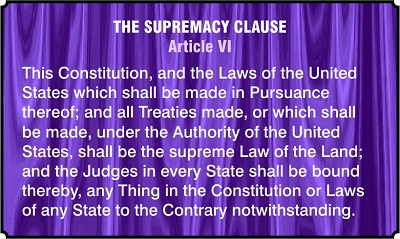The answer to this question begins with Article Six of the United States Constitution:

Only one law can be the supreme law of the land. While federal and state governments have the authority to create laws, federal law is the law that must be followed if the federal and state laws conflict.
The authority for this principle is found in the United States Constitution, as cited above. Article VI of the Constitution makes the laws of the United States “the supreme law of the land.” While this seems simple in the abstract, it often becomes more difficult and contentious when there is a state law that conflicts with a federal law. Accordingly, the legal doctrine of preemption developed from the Constitution’s Supremacy Clause.
Preemption Defined
The Constitution establishes that the laws and treaties of the United States are the supreme law of the land it does not address the issue of regulations created by federal agencies. The preemption doctrine has evolved over the years to include federal agency regulations and to mean that all federal laws, including regulations not passed by Congress but rather established by federal agencies, preempt all state laws.
While federal laws and regulations trump state laws and regulations, states retain the authority and the responsibility to enact and enforce state laws that do not conflict with federal laws.
When the federal government is explicit that the law preempts state law, then there is often no controversy. However, when the federal government does not specifically claim preemption over state laws and there is a conflict between federal and state law then the courts need to consider:
- If the federal government has “occupied the field” on the subject matter.
- Whether the state law directly conflicts with the federal law.
- Whether the state law would frustrate the intent of the federal law.
Preemption may be a concern in any area of the law, including matters regulated by the Federal Drug Administration (FDA).
How Preemption Applies to Defective Drug or Medical Device Cases
The FDA regulates the pharmaceutical industry. However, there is often a dispute as to whether state laws preempt federal FDA regulations. The federal appeals courts and the Supreme Court have weighed in on this topic in several different decisions over the past decade. The issue in most cases is whether the FDA approval process preempts state safety laws. Currently, most state laws having to do with design defects are preempted by federal law and the courts rule in favor of the defense when preemption is raised, as was the case in two recent Essure birth control cases.
The issue of preemption is a complicated one, as are many aspects of defective drug and medical device cases. Accordingly, it is always important to explore all of your legal options and to speak with an experienced lawyer before pursuing a claim.
RELATED LINKS